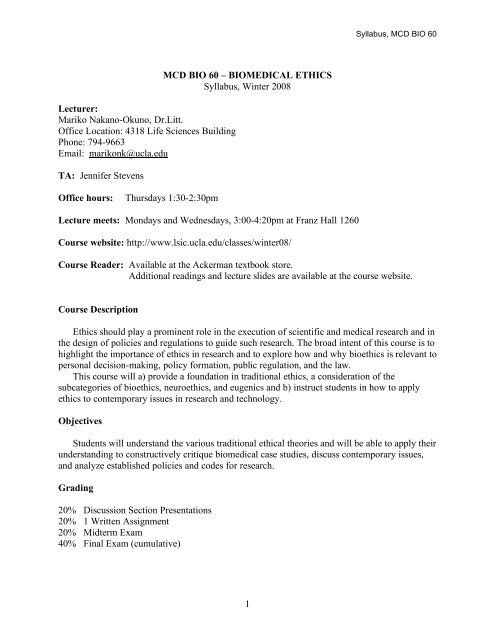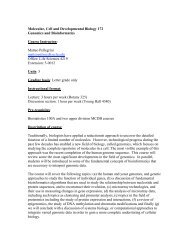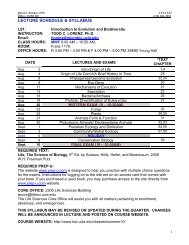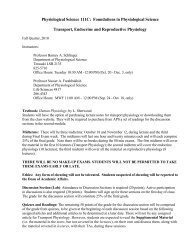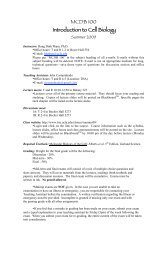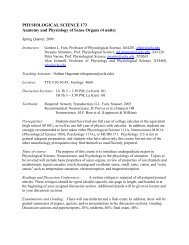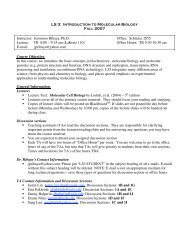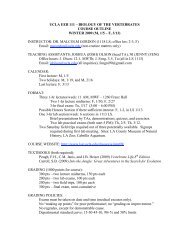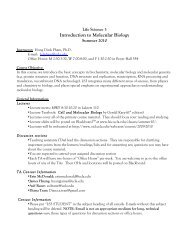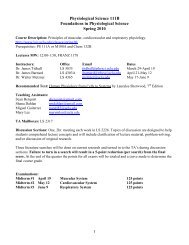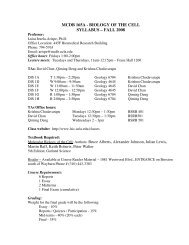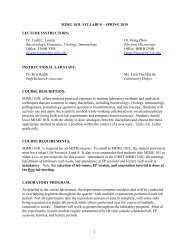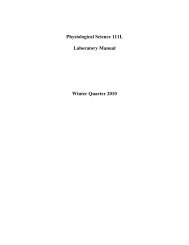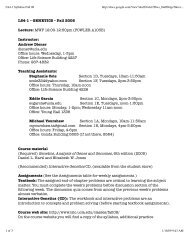1 MCD BIO 60 â BIOMEDICAL ETHICS Syllabus, Winter ... - UCLA
1 MCD BIO 60 â BIOMEDICAL ETHICS Syllabus, Winter ... - UCLA
1 MCD BIO 60 â BIOMEDICAL ETHICS Syllabus, Winter ... - UCLA
You also want an ePaper? Increase the reach of your titles
YUMPU automatically turns print PDFs into web optimized ePapers that Google loves.
<strong>Syllabus</strong>, <strong>MCD</strong> <strong>BIO</strong> <strong>60</strong><br />
Lecturer:<br />
Mariko Nakano-Okuno, Dr.Litt.<br />
Office Location: 4318 Life Sciences Building<br />
Phone: 794-9663<br />
Email: marikonk@ucla.edu<br />
TA: Jennifer Stevens<br />
<strong>MCD</strong> <strong>BIO</strong> <strong>60</strong> – <strong>BIO</strong>MEDICAL <strong>ETHICS</strong><br />
<strong>Syllabus</strong>, <strong>Winter</strong> 2008<br />
Office hours:<br />
Thursdays 1:30-2:30pm<br />
Lecture meets: Mondays and Wednesdays, 3:00-4:20pm at Franz Hall 12<strong>60</strong><br />
Course website: http://www.lsic.ucla.edu/classes/winter08/<br />
Course Reader: Available at the Ackerman textbook store.<br />
Additional readings and lecture slides are available at the course website.<br />
Course Description<br />
Ethics should play a prominent role in the execution of scientific and medical research and in<br />
the design of policies and regulations to guide such research. The broad intent of this course is to<br />
highlight the importance of ethics in research and to explore how and why bioethics is relevant to<br />
personal decision-making, policy formation, public regulation, and the law.<br />
This course will a) provide a foundation in traditional ethics, a consideration of the<br />
subcategories of bioethics, neuroethics, and eugenics and b) instruct students in how to apply<br />
ethics to contemporary issues in research and technology.<br />
Objectives<br />
Students will understand the various traditional ethical theories and will be able to apply their<br />
understanding to constructively critique biomedical case studies, discuss contemporary issues,<br />
and analyze established policies and codes for research.<br />
Grading<br />
20% Discussion Section Presentations<br />
20% 1 Written Assignment<br />
20% Midterm Exam<br />
40% Final Exam (cumulative)<br />
1
<strong>Syllabus</strong>, <strong>MCD</strong> <strong>BIO</strong> <strong>60</strong><br />
Assignments<br />
Discussion Section Presentations - Each week, a group of 4-5 students will lead the discussion<br />
section, with guidance from their teaching assistant. The discussion will consist of presenting a<br />
contemporary issue in ethics that is relevant to science, engineering, technology, or medicine and<br />
then analyzing that issue according to the material covered in class. The discussions will grow<br />
and expand over the quarter as students become fluent in the theories and language of ethics.<br />
Writing Assignment/Essay - Students are to provide an account of a practice, policy, or<br />
experiment and analyze it in order to summarize the rationale guiding the decision (including<br />
who is/was involved in the decision), elucidate a traditional ethical theory that would support or<br />
challenge the decision, characterize the ethical standards and codes of conduct that are/were<br />
followed, and consider the impact of changes in the social, temporal, or cultural context. This<br />
assignment will be done with a partner and is expected to be 5- 8 pages in length. Students will<br />
work with partners, but one essay per student should be submitted. Due March 5 th or earlier.<br />
Exams<br />
Mid-term and final exams will consist of multiple-choice questions. They will cover materials<br />
from lectures, readings, and discussion sections. Makeup exams will not be given. In case you<br />
have an illness or emergency and are unable to take an exam, you are responsible for contacting<br />
your TA before the examination. A written verification regarding the illness or emergency must<br />
be provided. If you feel that a mistake in grading has been made on your exam, submit your<br />
exam and a typed explanation to your TA by Friday 5pm of the week following the exam.<br />
Final Exam -- Thursday, March 20, 2008, 8:00am-11:00am<br />
Topic Schedule<br />
Jan.7, 2008<br />
Lecture 1–Biomedicine and Ethics: Advanced Science, International Collaboration,<br />
Interdisciplinary Research, and the Need for Non-Traditional Ethical Reasoning<br />
Includes: 1) the scope of “biomedical research” that this course will deal with; 2) examples of<br />
what interdisciplinary research looks like and the “give-and-take” of non-traditional partnerships;<br />
3) examples of ethical dilemmas in biomedical research; and 4) definition of “ethics,” and how<br />
ethics can deal with the issues in biomedical research.<br />
Jan.9, 14, 16, 23<br />
Lecture 2 through 5- Ethical Traditions and Theories<br />
Includes cultural relativism, egoism, Hobbes (Jan.9), Kant (Jan.14), Utilitarianism (Jan.16),<br />
Rawls and virtue theory (Jan.23).<br />
2
<strong>Syllabus</strong>, <strong>MCD</strong> <strong>BIO</strong> <strong>60</strong><br />
Jan.21 – Martin Luther King Jr., holiday<br />
Jan. 28<br />
Lecture 6 - The Importance of Language<br />
The role that language has in conveying a description as well as a potentially emotional or<br />
prescriptive meaning to a specific person, place, or thing. Words such as “human” and “embryo”<br />
are examples of the effect that language has on a biomedical issue. Includes R. M. Hare’s<br />
analysis of moral language, and his suggestion of “partly evaluative” meanings of certain<br />
apparent descriptions.<br />
Jan.30<br />
Lecture 7 - The Emergence of Science Policy and Bioethics<br />
Development of public oversight in science in the US and abroad, as well as key events and<br />
policies that shaped bioethics and the standards for ethical behavior in research.<br />
Feb.4<br />
Lecture 8 – Informed Consent: From the Bench to the Clinic<br />
Brief history of informed consent in biomedical research, comparing and contrasting the<br />
accountability of scientists and clinicians. Consideration of what kind of information should be<br />
given, what kind of consent should be obtained, and when the obtained informed consent should<br />
be regarded as invalid. Examination of hard cases, including randomized controlled / doubleblinded<br />
clinical trials and placebo-controlled trials. Also includes the relevance of “inclusive<br />
consent” or “presumed consent” in large-scale biomedical research.<br />
Feb.6<br />
Lecture 9 – Biotechnology and the Ownership of Science<br />
Conflicts of interest and the ethics of “owning” biology. Also includes the ethical meaning of the<br />
Patent system, and consideration of the influence of funding on scientific research.<br />
Feb. 11 Midterm Exam (Lectures 1 through 8)<br />
Feb. 13, 20<br />
Lecture 10 and 11 – Neuroethics: Using Science As A Crystal Ball<br />
Considers ethical issues in brain science, and analyses how a new study field “neuroethics” has<br />
emerged. Then discusses 1) the use of brain imaging for criminals, and 2) the recent<br />
advancement of psychosurgery by referring to the lessons from past lobotomy practices.<br />
Feb. 18 – Presidents’ Day holiday<br />
3
<strong>Syllabus</strong>, <strong>MCD</strong> <strong>BIO</strong> <strong>60</strong><br />
Feb. 25, 27<br />
Lecture 12 and 13 – Eugenic Implications of Reproductive Medicine and Genetic Testing<br />
Reproductive technology has advanced to the point where the genetic code of an individual can<br />
be scrutinized for potential phenotypes (diabetes, obesity) and birth defects at the 8-cell stage<br />
(prior to implantation into the uterus). The ethics of using these techniques, either widely or in<br />
restricted contexts, is quite controversial.<br />
Mar. 3<br />
Lecture 14 – Stem Cell Research: New Side, Same Coin<br />
Discussion of the continuity in the recombinant DNA (rDNA), in vitro fertilization (IVF),<br />
abortion, and human embryonic stem cell (hESC) debates. Includes debates over the moral status<br />
of the embryo, and the question of whether we may “sacrifice” someone for the benefit of others.<br />
Mar. 5<br />
Lecture 15– Falsification and the Accountability of Scientists<br />
Misconduct and fraud in scientific publishing, and the impact of the S. Korean stem cell scandal.<br />
Includes the role of the Office of Research Integrity. Consideration of various factors<br />
(psychological, environmental and social) that tempt or motivate some scientists to commit<br />
scientific fraud, the various effects of scientific misconduct on individuals and on society, and<br />
the most effective ways to prevent this kind of misconduct.<br />
Mar.10<br />
Lecture 16 – Global Pharma: What Goes Around, Comes Around<br />
Ethical issues in HIV/AIDS research and treatment, distributive justice, global access to<br />
antiretroviral drugs.<br />
Mar. 12<br />
Lecture 17– Experiments on Animals<br />
Examines different arguments for and against animal experiments, and their philosophical<br />
grounds. Discussion of the justifications, the due procedures, and the proper limit of the use of<br />
animals for biomedical research.<br />
Further Readings (Optional)<br />
Rachels, James. 2006. The Elements of Moral Philosophy, 5 th ed., McGraw-Hill.<br />
Beauchamp, Tom L. and Childress, James F. 2001. Principles of Biomedical Ethics, 5 th ed.,<br />
Oxford University Press.<br />
Kuhse, Helga and Singer, Peter (eds.) 1998. A Companion to Bioethics, Blackwell.<br />
4
<strong>Syllabus</strong>, <strong>MCD</strong> <strong>BIO</strong> <strong>60</strong><br />
Burley, Justine and Harris, John (eds.) 2004. A Companion to Genethics, Blackwell.<br />
Huxley, Aldous. 1998. A Brave New World.<br />
Ishiguro, Kazuo. 2005. Never Let Me Go, Knopf.<br />
Buchanan, Allen, Brock, Dan W., Daniels, Norman and Wikler, Daniel. 2001. From Chance to<br />
Choice: Genetics and Justice, Cambridge University Press.<br />
Evans, John H. 2002. Playing God? Human Genetic Engineering and the Rationalization of<br />
Public Bioethical Debate, University of Chicago Press.<br />
Glover, Jonathan. 2006. Choosing Children: Genes, Disability, and Design (Uehiro Series in<br />
Practical Ethics), Oxford University Press.<br />
Illes, Judy (ed.). 2005. Neuroethics: Defining the Issues in Theory, Practice and Policy, Oxford<br />
University Press.<br />
Ackerman, Sandra J. 2006. Hard Science, Hard Choices: Facts, Ethics, and Policies Guiding<br />
Brain Science Today (Dana Foundation Series on Neuroethics), Dana Press.<br />
Maienschein, Jane. 2003. Whose View of Life?: Embryos, Cloning and Stem Cells, Harvard<br />
University Press.<br />
Ruse, Michael and Pynes, Christopher A (eds.). 2003. The Stem Cell Controversy: Debating the<br />
Issues, Prometheus Books.<br />
Loue, Sana and Pike, Earl C (eds.). 2007. Case Studies in Ethics and HIV Research, Springer.<br />
Erwin, Edward. 1994. Ethical Issues in Scientific Research: An Anthology, Routledge.<br />
Macrina, Francis L. 2005. Scientific Integrity: Text and Cases in Responsible Conduct of<br />
Research, 3 rd ed., ASM Press.<br />
Thompson, Dennis F. 2004. Restoring Responsibility: Ethics in Government, Business, and<br />
Healthcare, Cambridge University Press.<br />
Welsome, Eileen. 2000. The Plutonium Files: America’s Secret Medical Experiments in the Cold<br />
War, Delta.<br />
Sandel, Michael J. 2004. “The Case Against Perfection.” The Atlantic Monthly, April, pp 51-62.<br />
Couzin, Jennifer and Michael Schirber, “Fraud Upends Oral Cancer Field Casting Doubt on<br />
Prevention Trial,” Science, 27 January, 2006.<br />
The President’s Council on Bioethics.<br />
www.bioethics.gov<br />
5


